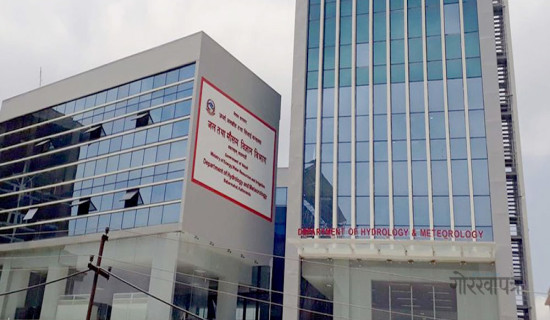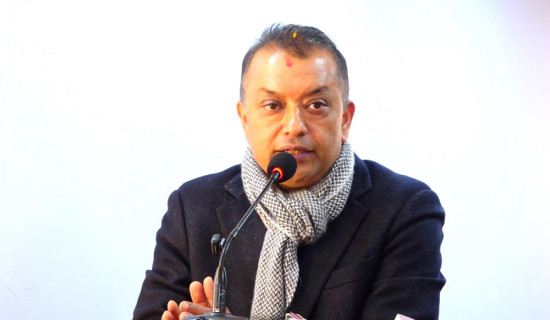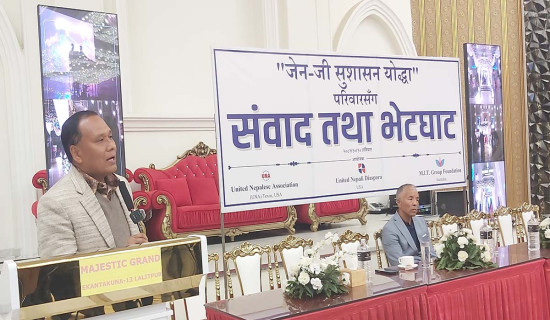- Sunday, 25 January 2026
Monitor Financial Sector Properly
There was a time when Nepal was passing through without a single financial institution. Nepal Bank Limited (NBL) was established on Kartik 30, 1994 BS. NBL is the first bank of Nepal to register as a joint venture between the government and public shareholders. Since its inception, NBL had carried out duel functions of the “Central Bank” as well as the “Commercial Bank” for nearly two decades. After the establishment of the Nepal Rastra Bank (NRB) as the central bank of the country on Baishakh, 14, 2013 BS, NBL was relieved of central bank roles. In 2019 BS, a “Cooperative Bank” was constituted which was later transformed into Agricultural Development Bank Limited (ADBL) in 2024 BS. People’s access to finance was a major issue of that time. To ensure the access of the rural poor, micro and medium entrepreneurs, and industry and business communities, the 2nd commercial bank, Rastriya Banijya Bank Limited (RBBL) was founded on 10 Magh 2022 BS.
Branch expansion
The major issues of the banking sector in those days were to increase their networks in urban, semi-urban and rural areas to invest in agriculture and enterprises thereby alleviating poverty. For those reasons, ADBL launched Small Farmer Development Programme (SFDP) with its structural network reaching out to the poor farmers in rural areas. Similarly, the two commercial banks of those days - RBBL and NBL - expanded their branches through an Intensive Banking Programme (IBP) otherwise known as Priority Sector Credit Programme throughout the country in a coordinated manner to cover all the districts with at least one bank branch for 30,000 households as mandated by the NRB. Likewise, the National Industrial Development Corporation (NIDC) was established to promote industries and create organised employment.
Similarly, the Rastriya Beema Sansthan was established on the 1st of Poush, 2024 BS to avail insurance services in the country. Rastriya Beema Sansthan immediately started non-life insurance schemes. In order to ensure the bank loans provided to the poor farmers, a new insurance agency was created on 4 Ashwin 2031 BS in the name of the “Credit Guarantee Corporation” which was later transformed into “Deposit and Credit Guarantee Corporation”.
With the adoption of the economic liberalisation policy in 2041/42 BS, a rise in private sector commercial banks, development banks, finance companies, microfinance banks, insurance companies, cooperatives, saving and credit unions and other non-bank financial institutions came into operation. Undoubtedly, economic liberalisation has encouraged competitive financial market in Nepal. However, the number of banks and other financial institutions has increased in an unplanned manner after the restoration of democracy in 2046 BS.
Further, in the last two decades, several categories of banks and non-bank financial agencies have mushroomed. In a country with a total population of 2.9 million and a tiny size of its economy (US$ 36 billion) constrained by limited industries and business environments, existing number of banks seems to be overestimated. As per NRB data till April 2022, there are 27 commercial banks, 17 development banks, 17 finance companies, 65 microfinance institutions, one infrastructure development bank and 15 other banks and investment companies. The number of insurance companies has also elevated from one in 2024 BS to 26 by 2079 BS. In addition, there are innumerable cooperatives operating around the country. Large numbers of the cooperatives are also engaged in saving and credit activities.
Looking at the current figures, one could notice a remarkable growth of banks and non-bank financial agencies but the issues are also huge at present. One of the greatest challenges in the past was to “create organisations” for expansion of financial services across the country. Contrary to that, there are so many of such agencies at present that necessitated the policy of their “merger”. As of now, NIDC has merged into Rastriya Banijya Bank; Janata Bank Ltd into Global IME Bank; Bagmati Development Bank into Sanima Bank Ltd. and some others. Several financial organisations are reported to be in the process of merger. Eventually, the number of commercial banks, development banks and finance institutions will be contracted to a manageable size.
Another burning issue of the financial sector at present is the lack of proper monitoring of the cooperatives. There was a time when NRB used to supervise few large cooperatives and the rest by the Ministry of Land Management, Poverty Alleviation and Cooperatives. Lack of cooperative monitoring structure at NRB and lack of banking/financial sector expertise at this ministry probably might have caused anomaly in monitoring the cooperatives. As a result, the cases of fraud by some cooperative managers appear in media more frequently in recent days. Lending to productive sector by the banks and financial institutions also seems slugged due to relaxed policies or lack of their proper implementation.
Financial literacy
Talking about the insurance system, non-payment of insured amount on a timely manner is raised as a main issue by many insurers. On the other hand, unavailability of crop and livestock insurance facilities in the rural and remote areas still remains a task unsolved. On the demand side of the financial services, inadequate financial literacy among the customers as well as the general people is a challenge. Just opposite to financial literacy, some banks exhibit over advertisement of their products that never turn into action in reality.
Visionary planning, workable regulations, financial discipline, strengthening capacity of related individuals and institutions, committed action in diverting investment to productive sectors, imparting appropriate financial literacy at various levels of customers, reducing the number of agencies and enriching the quality of their services and coverage up to remote areas followed by prompt monitoring might help overcome anomalies besetting the financial sector.
(A former banker, Dr. Bhandari is now a Senior Consultant at the Universal Sustainable Development Consultancy, Kathmandu. dr.an.bhandari@gmail.com)
















